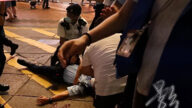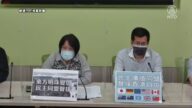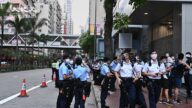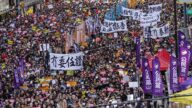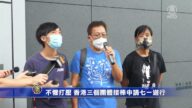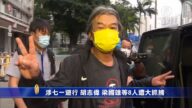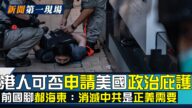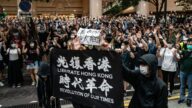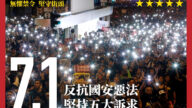【新唐人2012年7月3日訊】7月1號是香港回歸大陸的15週年紀念日。大批香港市民走上街頭,抗議北京當局對香港民主與自由的壓制。而根據海外媒體消息,大陸政法委與宣傳部門曾在3年前制定一項計劃,意圖在香港加強分化打擊和宣傳灌輸,對香港實施更有效的控制。雖然這個計劃沒有獲得政治局通過,但仍然被中央維穩辦與政法委所推行。
海外中文媒體報導,在香港參加「七.一 」安保任務的廣東維穩辦劉姓處長透露,這項計劃包括:對香港的異議人士進行分化與控制,切斷大陸維權人士與香港的聯繫,特別是不讓香港的維權人士進行抗議示威、造成大的影響。
對此,「中國社會民主黨中央委員會」主持人劉因全向《新唐人》分析指出,中共一直竭力強化一黨專制,不希望有任何的力量影響到它的專制統治。
「中國社會民主黨中央委員會」主持人劉因全:「 它(中共)擔心,如果對香港失控,香港會成為推動中國改革的一個窗口。大量的中國人、大陸人到香港去,受香港的影響,回去以後會推動中國的民主化。」
中央政法委推行的這項計劃還包括:對香港的親共媒體進行扶持,對於關注與支持大陸民眾進行維權等活動的媒體,則進行壓制,禁止它們在大陸採訪。
對此,香港《開放》雜誌總編輯金鐘表示,自從1997年香港實行所謂「 一國兩制」之後,中共對香港媒體使用了很多方法來進行控制。
香港《開放》雜誌總編輯金鐘:「所以媒體的聲音,獨立的、勇敢的聲音就比過去少了,但是還不是完全沒有,受到有這樣的影響。」
《法國國際廣播電臺》報導指出,「一國」凌駕於「兩制」之上導致的媒體自律和人權問題,讓港人非常擔憂。台灣陸委會的一份調查報告顯示,大陸駐香港機構介入香港選舉的傳聞比往年更多,香港媒體自我審查、不願批評北京當局的現象比往年也更為嚴重。
6月30號上午,中共總書記胡錦濤在九龍參觀,《蘋果日報》記者問胡錦濤,有沒有聽見港人要求平反六四的意願,結果被4名便衣警察以記者「講話太大聲」為由架走盤查。這引來各界對香港警方的譴責。
「香港記者協會」主席麥燕庭指責警方的做法是踐踏新聞自由,要求警方停止大陸化的手法。
「香港記者協會」主席麥燕庭:「因為大家距離很遠,你不喊出來,胡錦濤根本聽不見那個問題。所以其他記者也有喊問題,但是單單是這一個問胡錦濤『有沒有聽見香港人要求平反六四的聲音?』這個提問的記者,給扣留了15分鐘,我們就覺得警方是有政治審查。」
據報導,廣東維穩辦的劉姓處長還透露,按照香港《基本法》,下一屆特首就要實行直選,立法會也要直選,北京對此感覺壓力很大。因此,如何對港人灌輸所謂「愛國主義」教育,籠絡民心,成為北京未來5年的主要任務。
麥燕庭:「從最近香港大學的民意調查看,我覺得這個民心回歸的事情,它(中共)還沒有做成功。而且我覺得,從香港大學的那個民意調查看來,尤其是年輕人,對中國(中共)政府的認同感是越來越低,是創回歸以來的新低。」
麥燕庭強調,現在的香港人越來越關注人權、自由和法治,如果中共當局不順應民心、在這些方面有所改善,根本不可能得到香港民眾的認同。
採訪/劉惠 編輯/李謙 後製/朱娣
Beijing’s Plot Against Hong Kong’s Direct Election Exposed
The 1st of July is the 15th anniversary of Hong Kong’s
returning to Chinese rule from British rule.
A large number of Hong Kong『s citizens took to the streets,
protesting the Chinese Communist Party’s suppression
of local democracy and freedom.
Overseas media have exposed a plot made three years ago
by the Central Political and Legislative Affairs Committee (PLAC) and the propaganda department.
The scheme aims to control Hong Kong more effectively
by reinforcing disintegration, crackdown and propaganda.
The plan was said to have failed to get passed by the Politburo,
but was still carried out by the Central PLAC and Stability Preservation Office.
Mr. Liu, director of Stability Preservation Office Guangdong
branch, revealed details of the scheme to overseas media.
Liu took part in security preparations in Hong Kong on July 1st.
The plot was reported to have covered differentiating
between and controlling of Hong kong dissidents,
cutting off the mainland activists’ connections with
Hong Kong;
Especially, preventing the Hong Kong human rights activists’
protests and reducing the impact.
Chair of the Social Democratic Party of China, Liu Yinquan,
comments on the issue.
The CCP has long been trying to strengthen its one-party
rule, to avoid infiltration by other influences, says Liu.
Liu Yinquan: “It (the CCP) is afraid of losing control of
Hong Kong. If out of control, Hong Kong would become a window to advance China’s reform.
Influential mainland Chinese would then go to Hong Kong,
being influenced themselves while staying there.
They would play active roles for China’s democratization
when going back to the mainland."
The Central PLAC’s plot also includes supporting
Hong Kong’s pro-CCP media outlets;
slapping down the media that sides with the mainland rights
defense and banning their interviews on the mainland.
Jin Zhong, chief editor of Hong Kong’s Open magazine, notes
that since the “one country, two systems" model started in 1997,
the CCP has curbed Hong Kong’s media through various ways.
Jin Zhong: “That’s why there are fewer independent and
brave media voices compared to the past.
It’s not entirely disappeared yet,
but has suffered from such influences.”
RFA comments that the fact of “one country" overriding
the “two systems" has provoked issues
like Hong Kong media’s self-censorship and human rights.
That has made Hong Kong citizens feel increasingly fearful.
A survey of Mainland Affairs Council (Taiwan) shows that
mainland institutions stationed in Hong Kong were reported
to be getting more involved in local elections than in
previous years.
Hong Kong media shows more leaning to self-censorship
and reluctance in criticizing Beijing authorities.
On June 30, a journalist of the Apple Daily questioned
the CCP President Hu Jintao who was visiting Kowloon.
“Have you heard that Hong Kong people hope for a redress of
the June 4 incident?”
The journalist was forcibly removed by plainclothes police
for “loudly disrupting order.”
The event sparked condemnation from all sectors of society
at Hong Kong’s police headquarters.
Yin-Ting Mak, president of the Hong Kong Journalists
Association, accused police of trampling on press freedom.
She demanded a stop be put to mainland interference
in Hong Kong.
Yin-Ting Mak: “Hu Jintao was at a distance from journalists,
and wouldn’t be heard if the question was not shouted out.
Other journalists also shouted out the questions to him,
but only the one asking about redress of the June 4 incident
was detained for 15 minutes. The police conducted censorship.”
Reportedly, Guangdong Stability Preservation Office director,
Mr. Liu, also revealed that under great pressure,
the Beijing regime worries about the upcoming direct election
of the next-term Chief Executive and Legislative Council.
How to instill the CCP’s “patriotic" education and how to
win over the Hong Kong people have become its main task in the last five years.
Yin-Ting Mak: “The University of Hong Kong’s recent poll
shows the CCP) failed in getting the population’s support.
Especially Hong Kong’s young people, whose sense of
approval of the CCP is getting lower and lower,
it has now reached it’s lowest level
since Hong Kong’s return to CCP government.”
Yin – Ting Mak stresses that the people of Hong Kong are
Showing increasing concern over human rights, freedom and the rule of law.
She warns that if the CCP still refuses to comply with public
aspiration by improving on these issues.
It will never be recognized by the people of Hong Kong.


